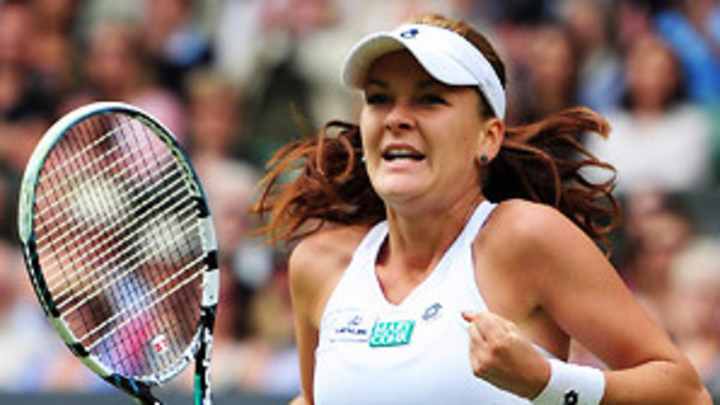Radwanska refreshingly brings tactics back into Wimbledon final

In a Centre Court semifinal that at times looked delightfully unfamiliar, Radwanska thoroughly outclassed Angelique Kerber 6-3, 6-4 to reach the first Grand slam final of her career. Some would say the breakthrough is long overdue for a woman ranked No. 3 in the world, but Radwanska takes nothing by storm. Hers is a slow, measured pace, on the court and in life. Most likely, she figures she has arrived precisely on time.
Her task on Saturday will be the most challenging of her career. Serena Williams earned the other final spot with a 6-3, 7-6 (6) victory over Victoria Azarenka, and as John McEnroe said on BBC television, "I hope Aggie Radwanska isn't watching this. She should just be enjoying her win. Because this is a little bit scary."
At stake, for Radwanska, is the stuff of one's wildest dreams. With a victory over Serena, she can claim the world's No. 1 ranking and become the first Polish woman ever to win Wimbledon.
In an era of deafening shrieks, incessant fist-pumps and the cries of "Come on!" every two or three minutes, Radwanska represents the essence of understatement, right down to her reaction to Thursday's match point: a couple of joyous hops, a ball swatted into the stands, some taps of the racket to acknowledge the crowd's applause, and a long look toward her box, where her mother and coach, Tomasz Wiktorowski, shared a heartfelt embrace. No dances, no theatrics, nothing beyond the quiet satisfaction over a task well executed.
It all seemed so easy this day for Radwanska, so perfectly according to plan. In truth, we didn't see the full extent of her approach, at times a dizzying mix of drop shots, lobs and off-pace slice. This match was more about working the angles, moving Kerber from side to side, keeping the points alive until the German felt the compulsion (usually misguided) to strike.
What we did see, though, was something different. The Wimbledon women's final, once the province of such creative artists as Billie Jean King, Evonne Goolagong, Virginia Wade and Martina Hingis, has become a battle fought exclusively from the baseline. Over the past 10 years, only once have the elements of variety and ingenuity come forth: in 2006, when Justine Henin and the victorious Amelie Mauresmo crafted a mural of exquisite texture.
It's that element of contrast that makes Radwanska's game so appealing. On the air for Tennis Channel at the French Open, Mary Carillo said, "No one has reminded me more of Hingis than this woman. She's quiet and doesn't leave any fingerprints."
To reach this point of her career, Radwanska had to make a life-changing decision. She's only 23, but family-related problems caused a major roadblock in her career and threatened to derail it altogether.
Her father, Robert, was a typically hands-on tennis dad who became more overbearing as the pro tour's spotlight intensified. At last year's French Open, where Radwanska blew a 4-1, 2-0 lead and lost to Maria Sharapova, Robert turned into a raving maniac when confronted by reporters, saying "she needs a psychiatrist" and"she will never win anything big if she plays like that" and "you cannot collapse in a match any more than she did."
This was the regrettable peak of a long-standing issue, and at the conclusion of last year's Wimbledon, she rejected her father's coaching and turned to Wiktorowski, coach of the Polish Fed cup team. It was quite revealing, then, to see her at this year's Miami event, referring to her dad as a "tourist" and dominating Maria Sharapova in the final, 7-5, 6-4 (she'd been 1-7 against Sharapova at that point).
What Radwanska has to offer, more than anything, is a clinic for underpowered players everywhere. She can finish when the opportunity arises, but she's more about placement and changes of direction. "It's not like she can beat you with winners, she's just very consistent," said fellow player Svetlana Kuznetsova. "She's always there. She makes you play. She's never going to lose a match to herself, you know what I mean?"
As frail as she may look, Radwanska has tremendous power in her legs. One of her distinctive shots is a crouching, defensive half-volley from the baseline, "pretty much doing the squat," she said at this year's French Open. "I've been doing it since I can remember, but now more and more. It is a reaction to the power."
Kerber, like so many players among the game's elite, has exceptional power. She can't wait to turn it loose and demoralize an opponent with a searing rocket from either wing. She found occasional satisfaction against Radwanska, but more often she was slightly off-balance, or flatly on the run, when she tried to unload. Too many of those bullets found the net, and Radwanska's remarkable patience had prevailed once again.
"I think I was maybe one, two steps slow today, and that made the difference," Kerber said afterward. "My plan was to be aggressive, but she moves so well, makes no mistakes, so it's tough to play consistently against her. What can I say? I gave it my best, but she was the better player."
This was the first major semifinal of Radwanska's career, and she admitted being nervous at the start. "Such an important match for both of us, sometimes you want it so much, your hand is a little bit shaking," she said. "But after a couple of games, I was really focusing on every point. I think I really did a great job today."
Radwanska is not terribly conversant in English, and to make matters worse, she got something caught in her throat during the postmatch interview. She tried to continue but kept excusing herself, and she was coughing uncontrollably as she hurried out of the room.
That is hardly a snapshot to remember. The story she told on the court, in the match of her life, was so much more telling.
